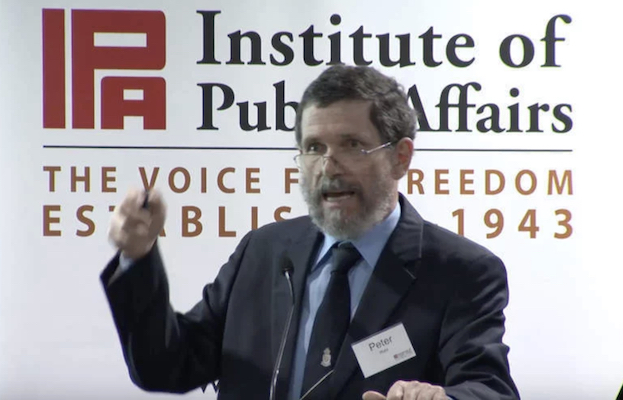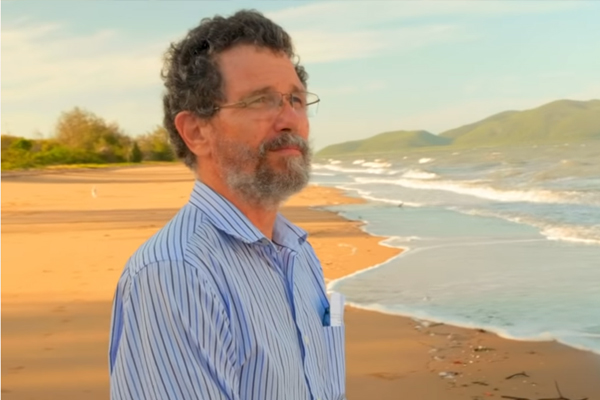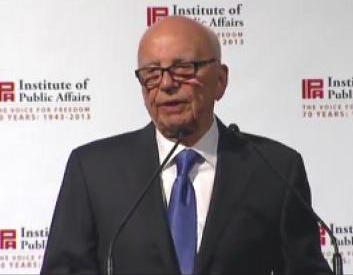Foreign-owned rag, The Australian, is outraged by foreign influence of environment groups fighting foreign-owned Adani coal mine, writes DeSmogBlog's Graham Readfearn.
RARELY does the Murdoch media in Australia need an invitation to attack environmentalists.
Whether it’s backing climate science denialists, or criticising environment groups for getting in the way of coal projects, News Corp Australia’s flagship The Australian newspaper is a reliable supporter of coal developments.
In recent days, the conservative media stable has pushed hard with a story plucked from the WikiLeaks release of the email inbox of John Podesta, the chairman of Hilary Clinton’s presidential campaign.
In short, The Australian newspaper “revealed” that Australian environment group The Sunrise Project was partly funded by the U.S.-based Sandler Foundation.
The little-known Sunrise Project, led by former Greenpeace staffer John Hepburn, has been working with conservation groups to challenge the proposed Adani mega-coal mine in Queensland.
What has enraged The Australian more than anything is that the WikiLeaks emails show there are foreign influences at play in challenges to the coal project.
Thinking Australians
Said the newspaper in an editorial:
'Thinking Australians, whatever their views about coal, should be appalled by the revelation.'
In fact, this is exactly the point at which “thinking Australians” should be able to see The Australian’s outrage for what it is — a grand hypocrisy mixed with confected outrage.
Does The Australian really want the public to be outraged by “foreign influence”, while ignoring the “foreign influence” of the Indian-owned company Adani that has been lobbying hard for years to be able to dig up 60 million tonnes of coal a year?
This, let’s remember, comes from a “foreign owned” newspaper whose proprietor, Rupert Murdoch, is an American citizen.
In an attempt to ram home its editorial line, rather than to try and give its readers some much needed perspective, the newspaper commissioned an editorial from Brendan Pearson of the mining industry group the Minerals Council of Australia.
Pearson wrote how the emails showed that the Sunrise Fundation was using “every ruse” to avoid disclosing its funders.
Full disclosure?
In fact, as frustrating as this is for journalists in Australia and elsewhere, groups campaigning on all sorts of issues have no legal obligation to disclose their funders.
For example, the Institute of Public Affairs (IPA), which has charitable tax status, pushes the denial of climate change science while issuing reports about the supposed benefits to Indian people from the Adani mine, without ever having to say where their money comes from.
In fact, the IPA used its status as an organisation that can attract tax-deductible donations, to publish a book pushing climate science denial and then allowed that book to be sold by Canadian conservative commentator Mark Steyn to help fund his own libel defence in the United States.
Would The Australian like to campaign on that one too?
What’s more, some funders will make it a condition that their identities are not disclosed and, in the case of the environmental movement, often to avoid just the kind of attacks from the mining industry that can see calls for charitable status to be revoked.
This is not so much a “ruse” to hide funders, as a legal obligation.
Is this the juncture when we point out that Pearson’s Minerals Council has a board of directors that includes representatives from several “foreign-owned” companies, such as U.S.-owned Peabody (currently filing for protective bankruptcy) and Anglo-Swiss mining corporation Glencore?
Many “foreign-owned” companies pay subscriptions to the Minerals Council for it to lobby on their behalf, including Adani.
Foreign influence?
In another email trail, forwarded to Podesta, Hepburn briefs a staff member at the Sandler Foundation over a parliamentary inquiry called to look at the charitable status of environment groups.
Hepburn discusses how the inquiry could force the Sunrise Project’s funders to be revealed.
The Sandler Foundation staff member then forwards the briefing to a contact at Human Rights Watch, saying:
'Full disclosure. We are a funder of the Sunrise Project as part of our work on climate change.'
Ken Roth, at HRW, responds:
'That the mining companies are going after the charitable status of an environmental organisation isn’t surprising but is very ugly. The mining companies seem to own the Liberals, and they play very dirty.'
Of course, Queensland’s peak mining lobby group the Queensland Resources Council (QRC) has been quick to join the attack — a group that could also be under “foreign influence” with directors also from Glencore and Peabody?
In a press release, QRC claims the emails show that Human Rights Watch had offered to 'lend its tax deductibility status to green activist groups'.
This would be a concerning issue if it was true, but it isn’t.
Nowhere in the emails does HRW offer to “lend its tax deductibility status”. HRW merely offered to help groups to understand the complexities of establishing a charity in Australia and there's no indication that this actually transpired.
The Australian’s story has been picked up by several members of the conservative Liberal Government to attack the charity status of environment groups that are engaged in efforts to block coal projects while receiving special tax privileges.
These groups, so the outrage goes, are only interested in slowing economic development while getting in the way of India’s poorest people being given access to electricity.
Foreign concern?
Actually, it is worth asking why foreign groups would want to fund activities to campaign against the rapid acceleration of fossil fuel exploitation in Australia.
That answer is a simple one. The impacts of climate change are not discriminatory. The impacts of fossil fuel burning in Australia, India, or anywhere else are felt across the globe.
As an issue of global concern, demonstrated by the existence of international agreements, don’t foreign groups have every right to be worried about expanding fossil fuel extraction, wherever it might take place?
Most “thinking Australians” probably know the answer to that and they won’t find it in the pages of The Australian or the press releases of the mining lobby — two places that, occasionally, appear to be one and the same.
This story was originally published on DeSmogBlog.com. You can follow Graham Readfearn on Twitter @Readfearn.
Monthly Donation
Single Donation
Don't be fooled. Subscribe to IA for just $5.









